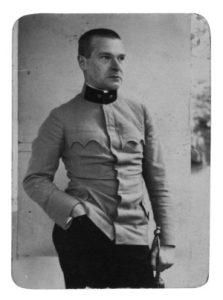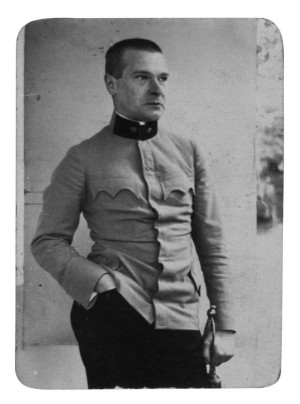Fleurs du Mal Magazine


Or see the index

Nachts
Die Bläue meiner Augen ist erloschen in dieser Nacht,
Das rote Gold meines Herzens. O! wie stille brannte das Licht.
Dein blauer Mantel umfing den Sinkenden;
Dein roter Mund besiegelte des Freundes Umnachtung.
Georg Trakl
(1887 – 1914)
Nachts
• fleursdumal.nl magazine
More in: #Experimental Poetry Archive, *War Poetry Archive, Archive S-T, Archive S-T, Expressionism, Trakl, Georg, Trakl, Georg

Bahnhöfe
Wenn in den Gewölben abendlich
die blauen Kugelschalen
Aufdämmern, glänzt ihr Licht in die Nacht hinüber
gleich dem Feuer von Signalen.
Wie Lichtoasen ruhen in der stählernen Hut
die geschwungenen Hallen
Und warten. Und dann sind sie
mit einem Mal von Abenteuer überfallen,
Und alle erzne Kraft
ist in ihren riesigen Leib verstaut,
Und der wilde Atem der Maschine, die wie ein Tier
auf der Flucht stille steht und um sich schaut,
Und es ist,
als ob sich das Schicksal vieler hundert Menschen
in ihr erzitterndes Bett ergossen hätte,
Und die Luft ist kriegerisch erfüllt
von den Balladen südlicher Meere
und grüner Küsten und der großen Städte.
Und dann zieht das Wunder weiter.
Und schon ist wieder Stille und Licht
wie ein Sternhimmel aufgegangen,
Aber noch lange halten die aufgeschreckten Wände,
wie Muscheln Meergetön, die verklingende Musik
eines wilden Abenteuers gefangen.
Ernst Stadler
(1883 – 1914)
Bahnhöfe
• fleursdumal.nl magazine
Der Dichter Ernst Stadler, geb. 1883, wurde 1914 in der ersten Flandernschlacht durch eine Granate getötet. Nachdruck der Originalausgabe aus dem Jahr 1920.
More in: #Experimental Poetry Archive, *War Poetry Archive, Archive S-T, Archive S-T, Ernst Stadler, Stadler, Ernst

Abendland
Else Lasker-Schüler in Verehrung
1.
Mond, als träte ein Totes
Aus blauer Höhle,
Und es fallen der Blüten
Viele über den Felsenpfad.
Silbern weint ein Krankes
Am Abendweiher,
Auf schwarzem Kahn
Hinüberstarben Liebende.
Oder es läuten die Schritte
Elis’ durch den Hain
Den hyazinthenen
Wieder verhallend unter Eichen.
O des Knaben Gestalt
Geformt aus kristallenen Tränen,
Nächtigen Schatten.
Zackige Blitze erhellen die Schläfe
Die immerkühle,
Wenn am grünenden Hügel
Frühlingsgewitter ertönt.
2.
So leise sind die grünen Wälder
Unsrer Heimat,
Die kristallne Woge
Hinsterbend an verfallner Mauer
Und wir haben im Schlaf geweint;
Wandern mit zögernden Schritten
An der dornigen Hecke hin
Singende im Abendsommer
In heiliger Ruh
Des fern verstrahlenden Weinbergs;
Schatten nun im kühlen Schoß
Der Nacht, trauernde Adler.
So leise schließt ein mondener Strahl
Die purpurnen Male der Schwermut.
3.
Ihr großen Städte
steinern aufgebaut
in der Ebene!
So sprachlos folgt
der Heimatlose
mit dunkler Stirne dem Wind,
kahlen Bäumen am Hügel.
Ihr weithin dämmernden Ströme!
Gewaltig ängstet
schaurige Abendröte
im Sturmgewölk.
Ihr sterbenden Völker!
Bleiche Woge
zerschellend am Strande der Nacht,
fallende Sterne.
Georg Trakl
(1887 – 1914)
Abendland
• fleursdumal.nl magazine
More in: Archive S-T, Archive S-T, Expressionism, Expressionisme, Lasker-Schüler, Else, Trakl, Georg, Trakl, Georg

Nähe des Todes
O der Abend, der in die finsteren Dörfer der Kindheit geht.
Der Weiher unter den Weiden
Füllt sich mit den verpesteten Seufzern der Schwermut.
O der Wald, der leise die braunen Augen senkt,
Da aus des Einsamen knöchernen Händen
Der Purpur seiner verzückten Tage hinsinkt.
O die Nähe des Todes. Laß uns beten.
In dieser Nacht lösen auf lauen Kissen
Vergilbt von Weihrauch sich der Liebenden schmächtige Glieder.
Georg Trakl
(1887 – 1914)
Nähe des Todes
• fleursdumal.nl magazine
More in: - Archive Tombeau de la jeunesse, Archive S-T, Archive S-T, Expressionism, Trakl, Georg, Trakl, Georg

Verlorenes Lied
Ich bin arm und habe nichts.
Nichts! Garnichts!
Nichts als lange Haare –
Bin zweiundzwanzig Jahre –
Sind rotes Gold, meine Haare,
Sagen die Kaufleut’ mir.
Ich bin arm und habe nichts.
Nichts! Garnichts!
Nichts als gemalte Brauen –
Fluch den ehrbaren Frauen! –
Sind tintenschwarz, meine Brauen,
Sagen die Schreiber mir.
Ich bin arm und habe nichts.
Nichts! Garnichts!
Nichts als kecke Blicke –
Weißt du, wem ich sie schicke ? –
Sind scharfes Schrot, meine Blicke,
Sagen die Jäger mir.
Ich bin arm und habe nichts.
Nichts! Garnichts!
Nichts als reife Lippen –
Tugend fährt über Klippen –
Sind kirschensüß, meine Lippen,
Sagen die Gärtner mir.
Ich bin arm und habe nichts.
Nichts! Garnichts!
Nichts als geschmeidige Sohlen –
Ei, in der Schenke das Johlen! –
Sind zum Tanzen gemacht, meine Sohlen,
Sagen die Spielleut’ mir.
Ich bin arm und habe nichts.
Nichts! Garnichts!
Nichts als weiße Glieder –
Blankes Gold lockert mein Mieder –
Sind Flammen der Lust, meine Glieder,
Sagst heute nacht du mir.
Ich bin arm und habe nichts.
Nichts! Garnichts!
Nichts als ein Leben in Schande,
Einen Tod am Straßenrande –
Einst in zerlumptem Gewande
Scharrt man mich ein im Sande.
Wo ? Sagt keiner mir.
Ich bin arm und habe nichts.
Nichts! Garnichts!
Nichts als die heimliche Zähre –
Daß ich so arm nicht wäre! –
Nur meine Dirnenehre!
Vom Strauch fällt die tausendste Beere;
Fault sie, wer sucht nach ihr ?
Sterb’ ich, wer weint nach mir?
Gertrud Kolmar
(1894 – 1943)
Verlorenes Lied
•fleursdumal.nl magazine
More in: *War Poetry Archive, Archive K-L, Archive K-L, Kolmar, Gertrud

In Venedig
Stille in nächtigem Zimmer.
Silbern flackert der Leuchter
Vor dem singenden Odem
Des Einsamen;
Zaubrisches Rosengewölk.
Schwärzlicher Fliegenschwarm
Verdunkelt den steinernen Raum
Und es starrt von der Qual
Des goldenen Tags das Haupt
Des Heimatlosen.
Reglos nachtet das Meer.
Stern und schwärzliche Fahrt
Entschwand am Kanal.
Kind, dein kränkliches Lächeln
Folgte mir leise im Schlaf.
Georg Trakl
(1887 – 1914)
In Venedig
• fleursdumal.nl magazine
More in: *War Poetry Archive, - Archive Tombeau de la jeunesse, Archive S-T, Archive S-T, Expressionism, Expressionisme, Trakl, Georg, Trakl, Georg

Soldatenmädchen
Und wenn du Männer zwingen willst,
So mußt du rasch dich rüsten
Und, eh’ im West der Schnee noch schmilzt,
Marschier’n nach Frankreichs Küsten.
Und wenn du Mädchen zwingen willst,
So weck’ nur dein Gelüsten,
Und ruh’ heut’ nacht, daß du es stillst,
An meinen weißen Brüsten.
Und was der Leute Mund drob’ red’t,
Den Spott will ich ertragen;
Wenn dir der Feind nicht widersteht,
Wie sollt’s dein Lieb wohl wagen ?
Ein heißes Herz ist noch kein Fehl,
Ein’ tapfre Seel’ kein Schaden,
Und wenn sich fanden Herz und Seel’,
Wird uns der Himmel gnaden.
Denn so ist dein und mein Geschick:
Dir schuf der Schmied die Waffen;
Den ros’gen Mund, den dunklen Blick,
Die hat mir Gott geschaffen.
Der Schuster hat die Schuh’ gemacht,
Die deinen Weg betraten,
Vom Schneider hab’ ich meine Tracht,
Mein Kindlein vom Soldaten.
Gertrud Kolmar
(1894 – 1943)
Soldatenmädchen
•fleursdumal.nl magazine
More in: *War Poetry Archive, Archive K-L, Archive K-L, Kolmar, Gertrud

Sonja
Abend kehrt in alten Garten;
Sonjas Leben, blaue Stille.
Wilder Vögel Wanderfahrten;
Kahler Baum in Herbst und Stille.
Sonnenblume, sanftgeneigte
Über Sonjas weißes Leben.
Wunde, rote, niegezeigte
Läßt in dunklen Zimmern leben,
Wo die blauen Glocken läuten;
Sonjas Schritt und sanfte Stille.
Sterbend Tier grüßt im Entgleiten,
Kahler Baum in Herbst und Stille.
Sonne alter Tage leuchtet
Über Sonjas weiße Brauen,
Schnee, der ihre Wangen feuchtet,
Und die Wildnis ihrer Brauen.
Georg Trakl
(1887 – 1914)
Sonja
• fleursdumal.nl magazine
More in: #Experimental Poetry Archive, - Archive Tombeau de la jeunesse, Archive S-T, Archive S-T, Expressionism, Trakl, Georg, Trakl, Georg

Der Brief
Ein Fetzen Weh, vom Wind daher gefegt,
Das war er nun.
Ich hab’ ihn still ins heil’ge Buch gelegt,
Zu ruhn – zu ruhn—–
Und die vergilbten Blätter schlössen ihn
So linde ein,
Wie Totenhülle, weißer denn Jasmin,
Der braune Schrein.
So fern der Unrast, die da draußen tost,
Hat er geruht.
Und war der Klage voll und gab mir Trost
Er war so gut—–
Gertrud Kolmar
(1894 – 1943)
Der Brief
•fleursdumal.nl magazine
More in: *War Poetry Archive, Archive K-L, Archive K-L, Kolmar, Gertrud

Vorfrühling
In dieser Märznacht trat ich spät aus meinem Haus.
Die Straßen waren aufgewühlt von Lenzgeruch und grünem Saatregen.
Winde schlugen an. Durch die verstörte Häusersenkung ging ich weit hinaus
Bis zu dem unbedeckten Wall und spürte: meinem Herzen schwoll ein neuer Takt entgegen.
In jedem Lufthauch war ein junges Werden ausgespannt.
Ich lauschte, wie die starken Wirbel mir im Blute rollten.
Schon dehnte sich bereitet Acker. In den Horizonten eingebrannt
War schon die Bläue hoher Morgenstunden, die ins Weite führen sollten.
Die Schleusen knirschten. Abenteuer brach aus allen Fernen.
Ueberm Kanal, den junge Ausfahrtwinde wellten, wuchsen helle Bahnen,
In deren Licht ich trieb. Schicksal stand wartend in umwehten Sternen.
In meinem Herzen lag ein Stürmen wie von aufgerollten Fahnen.
Ernst Stadler
(1883 – 1914)
Vorfrühling
•fleursdumal.nl magazine
More in: *War Poetry Archive, - Archive Tombeau de la jeunesse, Archive S-T, Archive S-T, Ernst Stadler, Stadler, Ernst
Under a Future Sky is a gathering of generations, a performance with ghosts anchored in Brynn Saito’s journey with her father to the desert prison where, over 80 years ago, her grandparents met and made a life.
 Born of a personal ache, an unquenchable desire to animate the shadow archive, Saito’s journey unfolds in lyric correspondences and epistolary poems that sing with rage, confusion, and, ultimately, love. In these works, descendants of wartime incarceration exchange dreams, mothers become water goddesses, and a modern daughter haunts future ruins. To enter this book is to enter the slipstream of nonlinear time, where mystical inclinations, yellow cedars, and sisterhood make a balm for trauma’s scars. Altogether, the work enacts a dialogue between the past and the present; the radical ancestor and the future child; and the desert prison and the family garden, where Saito’s father diligently gathers stones.
Born of a personal ache, an unquenchable desire to animate the shadow archive, Saito’s journey unfolds in lyric correspondences and epistolary poems that sing with rage, confusion, and, ultimately, love. In these works, descendants of wartime incarceration exchange dreams, mothers become water goddesses, and a modern daughter haunts future ruins. To enter this book is to enter the slipstream of nonlinear time, where mystical inclinations, yellow cedars, and sisterhood make a balm for trauma’s scars. Altogether, the work enacts a dialogue between the past and the present; the radical ancestor and the future child; and the desert prison and the family garden, where Saito’s father diligently gathers stones.
Brynn Saito is the author of Power Made Us Swoon (2016) and The Palace of Contemplating Departure (2013), winner of the Benjamin Saltman Poetry Award from Red Hen Press and a finalist for the Northern California Book Award. She has received grant support from Densho, Hedgebrook, and the Santa Fe Arts Institute. Her poems have appeared in the New York Times and American Review among other journals and anthologies. She was a finalist for the Paterson Poetry Prize and the Milt Kessler Poetry Book Award. Brynn lives in Fresno, CA, where she is an Assistant Professor at California State University, Fresno and co-director of Yonsei Memory Project.
Brynn teaches in the MFA program at California State University, Fresno. She’s co-editing with Brandon Shimoda an anthology of poetry written by descendants of the Japanese American / Nikkei incarceration, forthcoming in 2025 from Haymarket Books.
Under a Future Sky
by Brynn Saito
112 pages
August 15, 2023
ISBN-13 978-1636281070
Publisher: Red Hen Press
Hardcover
€20,99
•fleursdumal.nl magazine
More in: #Editors Choice Archiv, *War Poetry Archive, - Book News, - Bookstores, Archive S-T, Archive S-T, Racism

‘Easter 1916’.
Too long a sacrifice
Can make a stone of the heart.
O when may it suffice?
That is Heaven’s part, our part
To murmur name upon name,
As a mother names her child
When sleep at last has come
On limbs that had run wild.
What is it but nightfall?
No, no, not night but death;
Was it needless death after all?
W.B. Yeats
(1865—1939)
‘Easter 1916’
• fleursdumal.nl magazine
More in: *War Poetry Archive, Archive Y-Z, Archive Y-Z, Yeats, William Butler
Thank you for reading Fleurs du Mal - magazine for art & literature